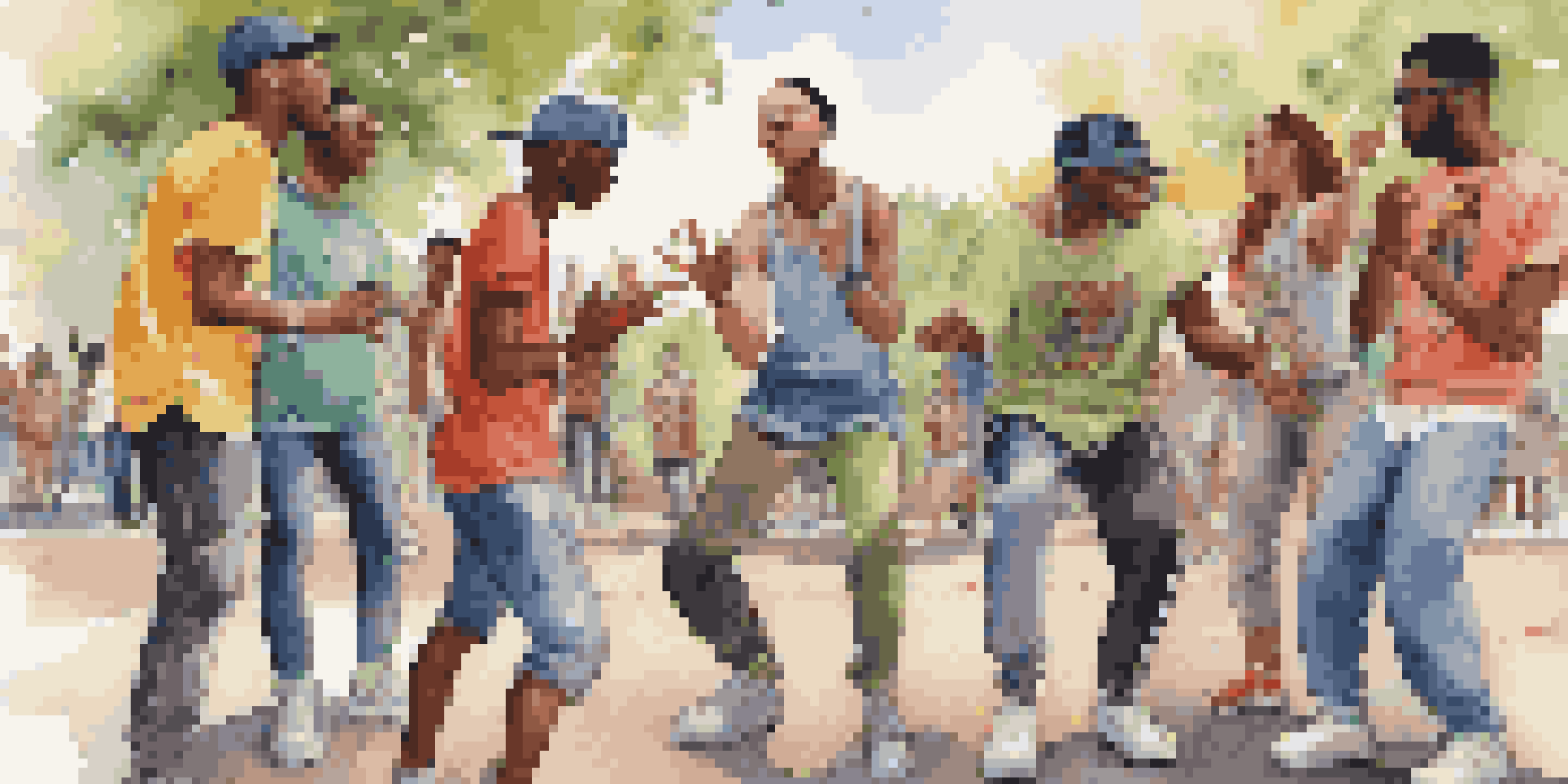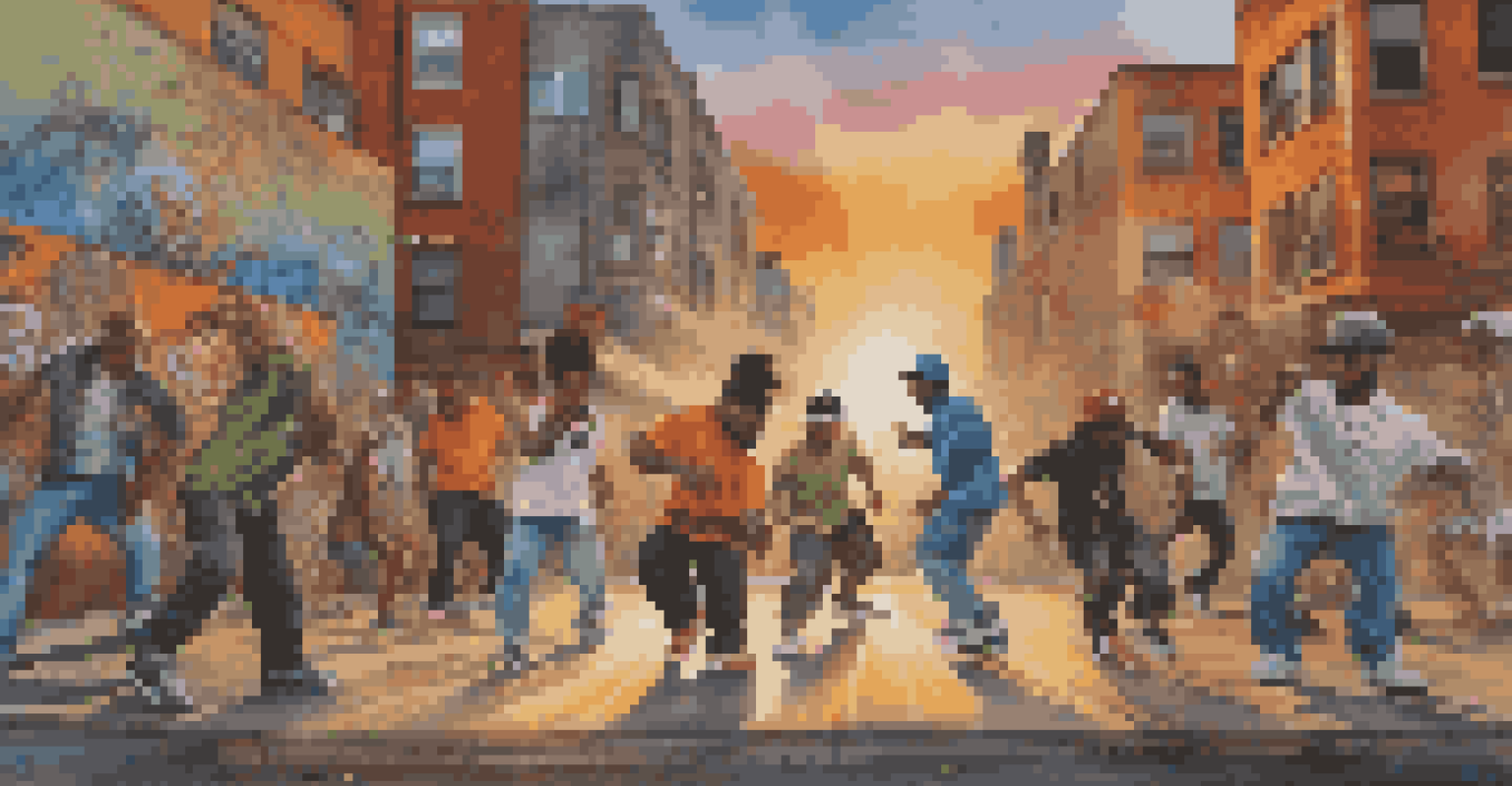The Growth of Hip-Hop: A Voice for Marginalized Communities

Origins of Hip-Hop: A Cultural Movement
Hip-hop emerged in the 1970s in the Bronx, New York, as a response to social and economic challenges. It wasn't just music; it was a cultural movement that encompassed graffiti, breakdancing, and DJing. As a form of expression, it provided a voice to those often overlooked in society.
Hip-hop is a way to express the struggles of the people, to put into words what we feel and go through every day.
The roots of hip-hop are deeply intertwined with African American and Latino communities, who faced systemic oppression and poverty. Artists used their craft to share their stories, shedding light on the struggles of their neighborhoods. This authenticity resonated with many, creating a strong sense of community.
As hip-hop grew, it became a platform not only for entertainment but also for activism. From early tracks that addressed police brutality to modern anthems calling for justice, hip-hop artists have consistently used their voices to challenge the status quo and advocate for change.
The Role of Storytelling in Hip-Hop
At its core, hip-hop is about storytelling. Artists weave narratives that reflect their lives and the realities of marginalized communities. Through vivid imagery and personal experiences, they invite listeners into their world, fostering empathy and understanding.

Take, for instance, the iconic track 'Dear Mama' by Tupac Shakur. In this heartfelt tribute, he shares the struggles and sacrifices of his mother, resonating with anyone who has faced adversity. Such storytelling not only honors the artist's experience but also uplifts the shared experiences of many.
Hip-Hop as a Cultural Movement
Emerging in the 1970s, hip-hop became a powerful cultural movement that combined music, art, and activism to give a voice to marginalized communities.
These narratives often highlight themes of resilience and hope, reminding listeners that despite systemic challenges, there is strength in vulnerability. Hip-hop artists empower their communities by validating their experiences and encouraging others to share their stories.
Hip-Hop as a Platform for Activism
Hip-hop has always been a powerful tool for activism. Artists like Public Enemy and N.W.A. used their music to confront racial injustices and police brutality head-on. Their bold messages have inspired generations to stand up for their rights and fight against systemic oppression.
We’re not just artists; we’re activists. We use our voice to speak for those who don’t have one.
In recent years, this tradition has continued with artists like Kendrick Lamar and J. Cole, who tackle issues such as mental health, racial inequality, and economic disparity. Their lyrics often serve as a call to action, urging listeners to engage with social issues and advocate for change.
Moreover, hip-hop has expanded its reach beyond music, influencing protests and movements across the globe. The genre unites people from diverse backgrounds, emphasizing that the fight for justice is a collective effort, resonating deeply within marginalized communities.
Diversity within Hip-Hop: Voices from All Walks of Life
While hip-hop originated in African American and Latino communities, it has grown to include diverse voices from around the world. Artists from various backgrounds have embraced the genre, bringing their unique perspectives and experiences into the mix. This diversity enriches the hip-hop landscape, creating a tapestry of stories and sounds.
For example, artists like M.I.A. and Bad Bunny have infused their cultural backgrounds into hip-hop, pushing boundaries and expanding its definition. Their contributions highlight the genre's versatility and its ability to adapt to different contexts, making it a truly global phenomenon.
Storytelling Empowers Communities
Through personal narratives and relatable themes, hip-hop artists foster empathy and understanding while uplifting the shared experiences of their communities.
This inclusion not only reflects the evolution of hip-hop but also fosters a sense of solidarity among marginalized communities. It demonstrates that the fight for equality and representation is universal, and hip-hop continues to be a powerful medium for amplifying these voices.
The Evolution of Hip-Hop: From Underground to Mainstream
Hip-hop has come a long way since its underground origins. Once dismissed as a fleeting fad, it has now become a dominant force in the music industry. This evolution has opened doors for many artists, allowing them to reach wider audiences while still addressing important social issues.
However, this mainstream success has also sparked debates about authenticity and commercialization. Some argue that as hip-hop becomes more commercialized, its original messages of resistance and empowerment may get diluted. Yet, many artists strive to maintain their integrity and stay rooted in their communities.
Despite these challenges, hip-hop remains a vital platform for marginalized voices. Even within the mainstream, artists continue to push boundaries and advocate for social justice, ensuring that hip-hop's core values of authenticity and activism endure.
Hip-Hop and Mental Health: Breaking the Stigma
In recent years, hip-hop has started to address mental health issues more openly. Artists are sharing their struggles with anxiety, depression, and trauma, helping to break the stigma surrounding mental health in marginalized communities. This openness is crucial, as it encourages others to seek help and speak about their own experiences.
For instance, Logic's '1-800-273-8255' highlights the importance of mental health awareness and suicide prevention. By sharing such personal narratives, artists create safe spaces for discussions that are often considered taboo, particularly in communities of color.
Hip-Hop's Role in Social Activism
Hip-hop has historically been a platform for activism, addressing social issues and inspiring collective action among diverse voices worldwide.
This shift not only empowers individuals to take charge of their mental health but also fosters a sense of community support. Hip-hop continues to evolve, reflecting the changing needs and conversations within society, proving that it can be a therapeutic outlet for many.
The Future of Hip-Hop: Continuing the Legacy
As hip-hop continues to evolve, its role as a voice for marginalized communities remains vital. New artists are emerging every day, bringing fresh perspectives and innovative sounds that challenge societal norms. This ongoing evolution ensures that hip-hop stays relevant and impactful.
Moreover, the rise of social media and digital platforms has democratized the music industry, allowing independent artists to share their stories without the constraints of traditional gatekeepers. This accessibility fosters a more inclusive environment, amplifying diverse voices and experiences.

Ultimately, the future of hip-hop lies in its ability to adapt while staying true to its roots. By continuing to uplift marginalized voices and advocate for social change, hip-hop will remain a powerful tool for expression and activism for generations to come.